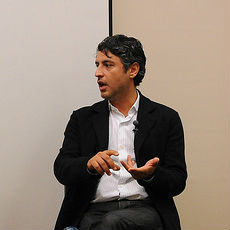The question that concerns many of the faithful and skeptics alike is, who was Jesus, really? Reza Aslan attempts to answer that question in Zealot. Tellingly, the subtitle is "The Life and Times of Jesus of Nazareth." This is because we have so little outside of the gospels to go on for Jesus' life. Part of the problem is that the 1st century C.E. Palestine was a hotbed of revolt and any official records of Jesus of Nazareth were destroyed in an uprising decades after his death. So, Aslan has to tell us what life was like for other people of Jesus' area, class, and time, as well as relying on the gospels. Jesus would have been illiterate, an emigrant from a village (Nazareth) to the temple city of Jerusalem, and part of the movement to push the Romans and their lackeys in the Temple out of Jewish territory violently. What made him different from the other disaffected Jewish charismatics? He gave away his services as a healer (which, given his skill, could have been a lucrative trade) and apparently came back from the dead. The Romans treated him as just another rabble rouser (Roman rule was so hated, this was a common occurrence) and had him crucified with many other seditious criminals, and left his body to be eaten by scavengers. And yet. Aslan also goes into the early history of the church, with the rival schools of John, Jesus' brother, and Paul to illuminate how the historical Jesus became obfuscated in the drive for converts.
While Reza Aslan has gotten some flack for his life story (emigrated from Iran, converted to Christianity, converted back to Islam), he seems to be a decent scholar. Zealot is copiously end-noted, and the writing style is lively without being flippant. Unlike some scholars, one gets a very good feel for the Judaism of the time, since Jesus and his followers considered themselves first and foremost Jews.
In No God but God, Aslan traces the history of Islam. He talks about how and why the Koran took the shape it did. He doesn't dwell so much on theology (though that is important) as on why the theology happened the way it did. Aslan looks at the Islamic empires and how we got the political borders of the modern Middle East. He spends a good bit of time dealing with the moderate and jihadist splits in Islam in the modern era, focusing on Iran. In this updated edition, Aslan covers the past decade in Islamic thought, including women's movements, the controversies in Europe, and the effect of Muslim communities in North America on Islam. He shows off his degree in creative writing when talking about the Sufis, taking on a more mystical tone. In short, it is a learned paean to the religion he was born in, then chose.



Add a comment to: Building a Mystery, Part II: Reza Aslan